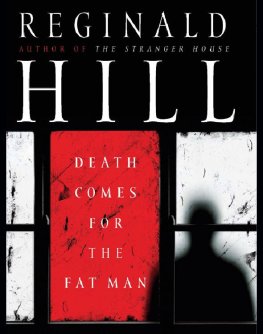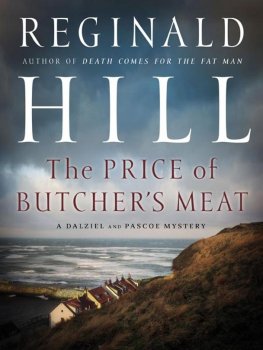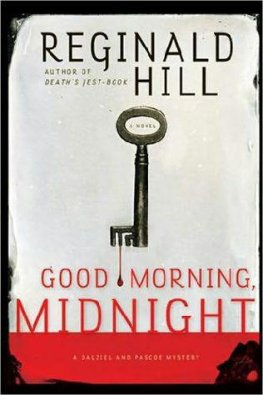Reginald Hill - Deadheads
Here you can read online Reginald Hill - Deadheads full text of the book (entire story) in english for free. Download pdf and epub, get meaning, cover and reviews about this ebook. year: 2011, genre: Detective and thriller. Description of the work, (preface) as well as reviews are available. Best literature library LitArk.com created for fans of good reading and offers a wide selection of genres:
Romance novel
Science fiction
Adventure
Detective
Science
History
Home and family
Prose
Art
Politics
Computer
Non-fiction
Religion
Business
Children
Humor
Choose a favorite category and find really read worthwhile books. Enjoy immersion in the world of imagination, feel the emotions of the characters or learn something new for yourself, make an fascinating discovery.

- Book:Deadheads
- Author:
- Genre:
- Year:2011
- Rating:3 / 5
- Favourites:Add to favourites
- Your mark:
- 60
- 1
- 2
- 3
- 4
- 5
Deadheads: summary, description and annotation
We offer to read an annotation, description, summary or preface (depends on what the author of the book "Deadheads" wrote himself). If you haven't found the necessary information about the book — write in the comments, we will try to find it.
Deadheads — read online for free the complete book (whole text) full work
Below is the text of the book, divided by pages. System saving the place of the last page read, allows you to conveniently read the book "Deadheads" online for free, without having to search again every time where you left off. Put a bookmark, and you can go to the page where you finished reading at any time.
Font size:
Interval:
Bookmark:
Reginald Hill
Deadheads
PART ONE
Or, quick effluvia darting through the brain,
Die of a rose in aromatic pain.
POPE: Essay on Man1
(Hybrid tea, coral and salmon, sweetly scented, excellent in the garden, susceptible to black spot.)
Mrs Florence Aldermann was distressed by the evidence of neglect all around her. Old Caldicott and his gangling son, Dick, had been surly ever since she had made it clear last autumn that far from being willing to admit the latter's insolent, nose-picking fifteen-year-old to the payroll, she was contemplating charging his elders for the barrowloads of fruit he had stolen from the orchard. Scrumping, old Caldicott had said. Theft, she had replied, and as she knew from her connections with the Bench that young Brent Caldicott had made several appearances in juvenile court already, she was not to be disputed with.
After that the youth had disappeared, but his father and grandfather had clearly been nursing a grievance ever since. Her recent indisposition had given them their chance.
There would have to be words. More than words. If she could find somebody to take their place, heads would roll. The thought fathered the deed.
Angrily seizing a Mme Louis Laperrire in her gloved hand, grasping it firmly to prevent unsightly spillage, she picked her spot, applied the razor-edged knife expertly, and with a single smooth slice removed the sadly drooping head which she dropped into a plastic bucket.
Only then did she become aware that she was being watched. Behind the mazy frame of sweet peas which divided the main rose-garden from the long lawn running down to the orchard (and which, she noted angrily, had been allowed to form seed-pods that, unremoved, would pre-empt flower growth) lurked a slight figure completely still.
'Patrick!' called Mrs Aldermann sharply. 'Come here!'
Slowly the boy emerged.
Aged about eleven, small still for his age, he had large brown eyes in a pale oval face which was almost oriental in its lack of expression. Mrs Aldermann regarded him with distaste. It wasn't just that he belonged to the same ghastly sub-species as Brent Caldicott, though that would have been enough. But in addition she could never look upon Patrick without thinking of his origins, and then the anger came welling up. It took little to uncap her vast pool of wrath, and in particular any display of human weakness brought it fountaining forth.
She had been angry eleven years earlier when her niece, Penelope, had announced that she was pregnant. She had been angrier when the feckless girl had refused to name the father, and angriest of all when she had calmly announced her intention of bringing up the child single-handed. Even Penelope's feckless mother, Florence Aldermann's younger sister, had had the wit to get a wedding ring from the object of her particular folly, George Highsmith, carpet salesman, though neither this nor the fact that they were both dead prevented Mrs Aldermann from still feeling angry with them. No, death was no barrier to anger; indeed it could be a cause of it. She still felt furious at her own husband's display of weakness in dying of a coronary thrombosis, with so much still to do, so much still to expiate, in these very gardens two years before.
And finally her anger had turned upon herself when she collapsed in Knightsbridge on a pre-Christmas shopping expedition six months earlier. To be taken ill was deplorable; to have suffered a heart-attack, which she'd come to regard as a typically masculine form of weakness, was unforgivable.
Fortunately (she saw this now, though at the time she'd tended to blame her, as if 'weakness' were an infectious condition) she'd been with Penelope at the time, good-natured, unflappable Penny who had not taken the least offence (indeed, why should she?) when told after her Uncle Eddie's death that the charitable allowance he'd been making her for so many years would have to stop, times and taxes being so hard, and who had seemed quite satisfied with the substitution of tea at Harrod's on her Aunt Flo's bi-annual London visits.
A few weeks later the 'sixties dawned. Could Mrs Aldermann have foreseen flower-power, pop-art, swinging London and all the age's other lunar and lunatic achievements, she would have greeted it with vast indignation. As it was, the best she could manage in her state of ignorance and intensive care was vast indifference. Shortly afterwards she recovered enough to transfer to a luxurious private clinic. Her first real emotion and almost her second heart-attack occurred when she was well enough to enquire how much it was costing her. As soon as possible thereafter she declared herself fit enough to return to Rosemont, her Yorkshire home, to convalesce. Clearly unable to look after herself properly, she, with her doctor's help, persuaded her easy-going untied-down niece to accompany her, a large saving on a professional nurse. And during the weeks that followed, Mrs Aldermann had come to value Penelope for more than purely economic considerations. She was what all self-regarding, moderately wealthy ladies of the middle class long for: a treasure. Hard-working, easy-going, entertaining of speech and unresentful of indignity, she fell short only in the department of subservient gratitude. And, of course, of Patrick.
But even with these deficiencies admitted, Mrs Aldermann as she recovered had begun to toy with the idea of offering Penny a permanent place at Rosemont which was far too large for one old woman living by herself. There would be no question of salary, of course they were after all blood relations but a small allowance would be in order, and there would be the large inducement of a change of will substantially in Penny's favour.
The proposal had been made. To her amazement and irritation, instead of jumping gratefully at the chance, the feckless girl had looked dubious and talked rather nostalgically of London. What had London to compare with this pleasant old house of Rosemont with its fine gardens, beautiful views, and all of Yorkshire's loveliest towns within easy striking distance? She had once seen the kind of place her niece lived in, a dingy two-roomed basement flat in a district where the bus queue looked like an audition for the Black and White Minstrel Show. Why should she need time to think about so incredibly generous an offer which had even included the not altogether unselfish undertaking to place Patrick at a modest though decent private boarding-school?
So now the sight of the boy spying on her added its weight to her already great burden of anger and she opened her mouth to utter a peremptory dismissal.
But before she could speak, he said, 'Uncle Eddie used to do that.'
Taken by surprise this was after all to the best of her recollection the first time the boy, in any of his visits, had ever actually initiated an exchange with her she replied almost as if he were a real person.
'Yes, he did,' she said. 'And Caldicott might have done it. But he didn't. So now I have to do it.'
Her intonation placed old Caldicott and her dead husband in the same category of duty-neglecters. She sliced off another sweet-smelling but overblown Mme Louis Laperrire with emphatic deftness.
'Why do you do it?' demanded Patrick.
His tone was a trifle brusque but she graciously put this down to the awkwardness of a tyro.
'Because,' she lectured, 'once the flowers have bloomed and begun to die, they inhibit that is to say, they stop other young flowers from developing and blooming. Also the petals fall and make the bush and the flower-beds look very untidy. So we cut off the blooms. It's called deadheading.'
'Deadheading,' he echoed.
'Yes,' she said, beginning to enjoy the pedagogic mood. 'Because you cut off the deadheads, you see.'
Font size:
Interval:
Bookmark:
Similar books «Deadheads»
Look at similar books to Deadheads. We have selected literature similar in name and meaning in the hope of providing readers with more options to find new, interesting, not yet read works.
Discussion, reviews of the book Deadheads and just readers' own opinions. Leave your comments, write what you think about the work, its meaning or the main characters. Specify what exactly you liked and what you didn't like, and why you think so.








